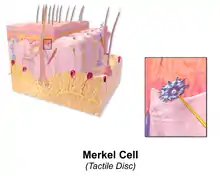Ellen Lumpkin
Ellen Lumpkin is an American neuroscientist and professor of cell and developmental biology and neurobiology at the Helen Wills Neuroscience Institute at the University of California, Berkeley.[1] She is also co-director of the MBL Advanced Training Course in Neurobiology, and adjunct associate professor of physiology and cellular biophysics and co-director of the Thompson Family Foundation Initiative in CIPN and Sensory Neuroscience at Columbia University.[1] Lumpkin's group studies genes, cells and signals that mediate the sensation of touch.[2] Lumpkin is most interested in the somatosensory system and how it gives feedback to the brain on sensations such as pain or touch. She is known for her significant contributions in somatosensory system research.[2]
Early life and education
Lumpkin was born in rural East Texas in an agriculturally-based town, where she spent her childhood years driving tractors and raising cows and pigs. In high school, she joined Future Farmers of America, which fully funded her college education given that she majored in agriculture and went to a local state university. Lumpkin earned a B.S. in Animal Science at Texas Tech University in Lubbock, Texas.[1] During her undergraduate years, Lumpkin studied the effects of stress on the health of animals, more specifically, how certain social or shipping conditions can lead to weight loss of pigs by the stress hormone cortisol. Lumpkin performed PhD training in neuroscience with A. James Hudspeth at University of Texas Southwestern and the Rockefeller University.[1]

Career and research
Lumpkin worked at Columbia University as an associate professor and researcher for 11 years.[2] She now does research at the University of California, Berkeley in the Molecular and Cell Biology department studying the somatosensory system.[2][3] Lumpkin's lab studies the somatosensory pathways that encode various stimuli like touch, vibration, and texture.[4] Her research is on the skin's sensory neurons pick up tactile features of objects and how skin cells communicate with the neuro system to encode touch.[5]
Merkel cells are found in clusters called touch domes, which are then connected to neuronal networks.[2] Lumpkin studies how these cells respond to the sensation of touch by sensing shape, form, and texture.[6] Ellen Lumpkin and her team discovered the specialization of Merkel cells involved in encoding different aspects of the sensation of touch.[1][7] Her team discovered that Merkel cells have fast, mechanically activated ion channels, they are capable of sending information to activate sensory neurons, and the activity of Merkel cells is required during touch stimulation.[1] These findings allowed her lab to conclude that Merkel cells are mechanosensory receptor cells, and she published a paper explaining these results in 2019.[8] Her research has also disproved the common belief that Merkel cells are descended from the neural crest, instead showing that they originate in the skin[9]
Awards
On January 15, 1999, she received the Runyon-Winchell Fellowship Award.[10] She won the Schaefer Scholars Award in 2015. She currently serves as the Co-Director of the Thompson Family Foundation Initiative in CIPN & Sensory Neuroscience.[11]
References
- "Meet-the-Expert: Feeling the Pressure – My Path to Sensory Neuroscience with Ellen A. Lumpkin, PhD". neuronline.sfn.org. Retrieved 2021-12-06.
- "Episode 16: Ellen Lumpkin, PhD". Conjugate: Illustration and Science Blog. Retrieved 2021-12-01.
- "Ellen Lumpkin". The Daily Sentinel. Retrieved 2021-12-06.
- Wellnitz, Scott A.; Lesniak, Daine R.; Gerling, Gregory J.; Lumpkin, Ellen A. (2010). "The Regularity of Sustained Firing Reveals Two Populations of Slowly Adapting Touch Receptors in Mouse Hairy Skin". Journal of Neurophysiology. 103 (6): 3378–3388. doi:10.1152/jn.00810.2009. ISSN 0022-3077. PMC 2888253. PMID 20393068.
- "The Pipette Gazette » Uncovering Our Sense of Touch: Dr. Ellen Lumpkin". pipettegazette.uthscsa.edu. Retrieved 2021-12-06.
- Lumpkin, Ellen A.; Caterina, Michael J. (2007). "Mechanisms of sensory transduction in the skin". Nature. 445 (7130): 858–865. Bibcode:2007Natur.445..858L. doi:10.1038/nature05662. ISSN 1476-4687. PMID 17314972. S2CID 4391105.
- "PBIO seminar series: Ellen Lumpkin". Physiology and Biophysics. Retrieved 2021-12-06.
- Jenkins, Blair A; Fontecilla, Natalia M; Lu, Catherine P; Fuchs, Elaine; Lumpkin, Ellen A (2019-02-22). Nathans, Jeremy; Bronner, Marianne E (eds.). "The cellular basis of mechanosensory Merkel-cell innervation during development". eLife. 8: e42633. doi:10.7554/eLife.42633. ISSN 2050-084X. PMC 6386521. PMID 30794158.
- Morrison, Kristin M.; Miesegaes, George R.; Lumpkin, Ellen A.; Maricich, Stephen M. (2009-12-01). "Mammalian Merkel cells are descended from the epidermal lineage". Developmental Biology. 336 (1): 76–83. doi:10.1016/j.ydbio.2009.09.032. ISSN 0012-1606. PMC 2783667. PMID 19782676.
- "Online News Vol. 3, No. 2: Jan. 15, 1999". depts.washington.edu. Retrieved 2021-12-01.
- "The Science Behind a Soft Caress". Columbia University Irving Medical Center. 2018-11-08. Retrieved 2021-12-06.